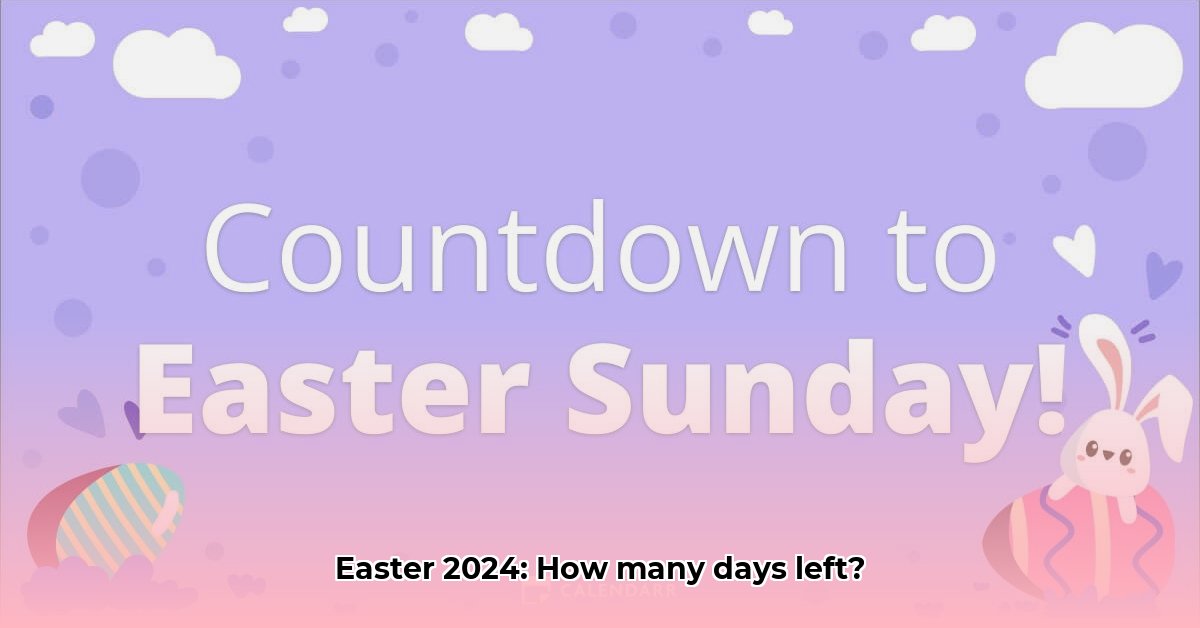Ever wondered exactly when Easter will grace us with its presence? It’s a question that leads down a fascinating rabbit hole of history, astronomy, and cultural traditions. Unlike many holidays with fixed dates, Easter dances across the calendar, making its arrival a yearly puzzle to solve. This article will provide you with the answer to “when is Easter?” but also explore the captivating story behind its ever-changing date, the significance of the holiday, and valuable tips for planning your Easter celebrations. To help with planning, you might find it useful to calculate the days until a specific date, like days until March.
Decoding the Easter Date: A Blend of Astronomy, History, and Calendars
So, you’re eager to mark your calendar for Easter? Great! But before you do, understand that determining the precise date of Easter is far from straightforward. It’s a unique blend of astronomical events, historical decrees, and different calendar systems.
The Wandering Holiday: Unveiling the Astronomical Connection
Easter’s date is not arbitrary; it’s profoundly rooted in astronomical events, specifically the vernal equinox (also known as the spring equinox) and the cycles of the moon. In 325 AD, the Council of Nicaea established that Easter should fall on the first Sunday following the first full moon occurring on or after the spring equinox.
The spring equinox, marking the moment when day and night are nearly equal, typically occurs around March 20th or 21st in the Northern Hemisphere. The full moon that follows sets the stage for Easter Sunday. This system ensures that Easter maintains a connection to the natural rhythms of the seasons and the lunar cycle, linking the holiday to ancient agricultural and religious practices. What makes this connection unique to spring holidays?
Gregorian vs. Julian: Understanding the Calendar Divide
The plot thickens when you introduce the Gregorian and Julian calendars. While the Gregorian calendar is the standard in most of the world today, some Eastern Orthodox churches still adhere to the Julian calendar. The Julian calendar runs approximately 13 days behind the Gregorian calendar, leading to discrepancies in the dates of religious observances, including Easter. So, while Western Christians may celebrate Easter on one date, Eastern Orthodox Christians may celebrate it several weeks later. This difference highlights the complex interplay between history, religion, and the evolution of timekeeping systems. How do differing calendars shape cultural identity?
More Than Just Eggs and Bunnies: The Profound Significance of Easter
Beyond the colorful eggs, chocolate bunnies, and festive gatherings, Easter holds deep religious significance for Christians worldwide. It commemorates the resurrection of Jesus Christ from the dead, a cornerstone of Christian faith and theology. Easter symbolizes hope, renewal, and the promise of eternal life. The days leading up to Easter, known as Holy Week, are a time of solemn reflection and remembrance, culminating in the joy and celebration of Easter Sunday. What are the origins of easter traditions?
Planning for Easter: A Practical Guide
Given the variable nature of Easter, careful planning is essential. Here’s a practical guide to help you navigate the Easter season effectively:
| Stakeholder | Short-Term Planning (Weeks Before) | Long-Term Planning (Months/Years Ahead) |
|---|---|---|
| Businesses | Order inventory, schedule staff, launch marketing campaigns, and decorate stores with Easter themes. | Analyze past Easter sales, forecast future trends, and develop adaptable marketing strategies. |
| Individuals & Families | Plan travel, book accommodations, finalize menus, purchase gifts, and coordinate family gatherings. | Create a family calendar with potential Easter dates, explore new traditions, and budget accordingly. |
| Religious Organizations | Finalize service schedules, organize volunteer teams, and promote Easter events within the community. | Develop a long-term liturgical calendar, train new volunteers, and assess community needs. |
Easter Across Cultures: Global Traditions and Celebrations
Easter is celebrated in diverse ways around the world, reflecting a fascinating tapestry of cultural traditions and religious customs. In some countries, elaborate processions and passion plays reenact the events of Holy Week. In others, families gather for festive meals, egg hunts, and the exchange of gifts. From the vibrant decorations of Latin America to the traditional foods of Eastern Europe, Easter takes on unique expressions in different regions of the world. These variations showcase the holiday’s global appeal and its ability to adapt to local customs and traditions. How does globalization affect holiday celebrations?
Easter 2024 and Beyond: Looking Ahead
Easter’s date will continue to shift in the years to come, guided by the same astronomical and historical principles that have shaped its observance for centuries. Staying informed about these calculations ensures that you can plan your celebrations accordingly and appreciate the rich history and significance of this important holiday.
Understanding the Calculation: A Journey Through Calendars and Councils
Key Takeaways:
- Easter’s date is determined by the vernal equinox and the full moon.
- The Gregorian and Julian calendars lead to different Easter dates for some Christians.
- Easter is a time of profound religious significance and cultural celebration.
- Careful planning is essential for businesses, families, and religious organizations.
Unraveling the Mystery: When is Easter 2024?
So, when will Easter 2024 actually occur? For those following the Gregorian calendar, Easter Sunday falls on April 20th, 2025. This date aligns with the established rules set forth centuries ago, connecting the celebration to ancient traditions and astronomical events.
Delving into the Details: The Council of Nicaea and Beyond
The Council of Nicaea in 325 AD played a pivotal role in shaping the way Easter’s date is calculated. The council aimed to create a unified celebration across the Christian world, establishing the connection to the spring equinox and the lunar cycle. This decision has had a lasting impact on how Easter is observed to this day, shaping religious practices and cultural traditions for centuries. How has this shaped religious practices globally?
Embracing the Diversity: Celebrating Easter Across Denominations
While the calculation of Easter’s date may differ between Christian denominations, the underlying message of hope, renewal, and resurrection remains the same. Easter is a time for reflection, celebration, and connection with loved ones, regardless of the specific date on which it is observed.
Final Thoughts: Easter – A Celebration of Hope and Renewal
Easter is far more than just a date on a calendar; it’s a celebration of hope, renewal, and the enduring power of faith. As we approach Easter, may we all take time to reflect on its profound meaning and embrace the joy and promise of this special time of year.
















